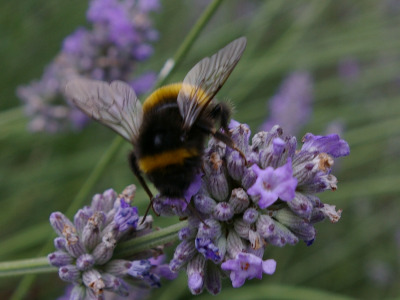Bee Nest By The Door
- What Should I Do?
Recently I had a query from a lady who was worried about 2 bee nests by her back door. She was concerned she would not be able to get out of the house.
If the bees had been honey bees, I would have suggested she call a beekeeper.
In the case of solitary bees, they can usually be left alone, but if you are in the USA there is a separate page about carpenter bees.
This particular lady had bumble bees. I find that most people who have bumble bee nests are worried unnecessarily about stings, when in fact, they are generally quite docile and not out to sting anyone. I decided to share my reply to this lady, since it may be useful to other visitors to my site. Do see the other links on my website for further information and assistance.
Bee Nest By The Door
Query: What should I do about 2 bee nests by my back door? I'm afraid to go in and out of the house into the garden.
My reply:
Firstly, may
I ask if there is any way you can leave them?
Bumble bee nests only last a season.
They are not aggressive and are only interested in getting out, foraging
and raising the colony. Would it worry
you, for example, to watch a group of bumble bees on lavender? This situation with busy bees, is not much
different.
Perhaps you could put in place a temporary barrier, such as some trellis, or a tall plant in a pot, or something else that is tall? This will guide the bees away from your door.
I am aware that a similar effect has also been achieved with a barrier of tall canes - this is inexpensive and temporary.
If you see a species a species that looks similar to that above (or below), this is a tree bumble bee - Bombus hypnorum. Toward the end of the colony lifecycle, males may gather close to the next entrance and create a small cloud of bees. These are males, and do not be alarmed because they cannot sting. They are simply waiting for new queens to emerge from the nest.
Queens and males are the last to emerge from the nest, and signify that the colony will not last much longer.
Whilst relocating bumble bees can be done, it is not always successful, but better than nothing.
You can call a pest control company and ask them how they deal with bumble bees, ensuring you select one that relocates, rather than kills the bees. There will be a charge for this of course.
I also have guidance on my web page here, with instructions of how to relocate bees:
It would be a shame, however, since bumble bees are quite docile, and nests are only temporary.
It's important to protect bumble bee nests if we can
Bees are having such a hard time – here is a report regarding the decline of bumblebees (almost a quarter facing extinction in Europe from the IUCN:
http://www.iucn.org/?14612/Bad-news-for-Europes-bumblebees
– in the UK, we’ve already had extinctions.
Only about 18% of colonies are successful in the first place, according to research (success means having the chance to produce males and queens).
Given the temporary nature of bumble bee nests, it's better to leave them alone if we can.
If you found this page helpful or interesting, I'd really be grateful if you would share it with others - if not this page, perhaps another, such as Gardening For Bees.
Thank you so much :) .

